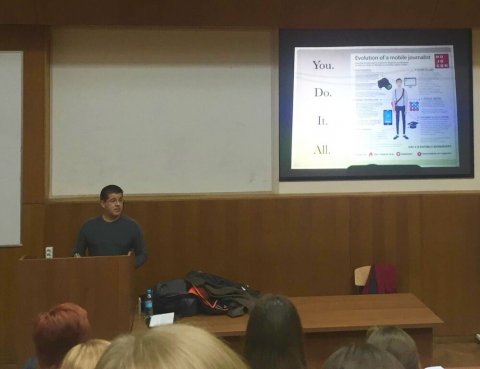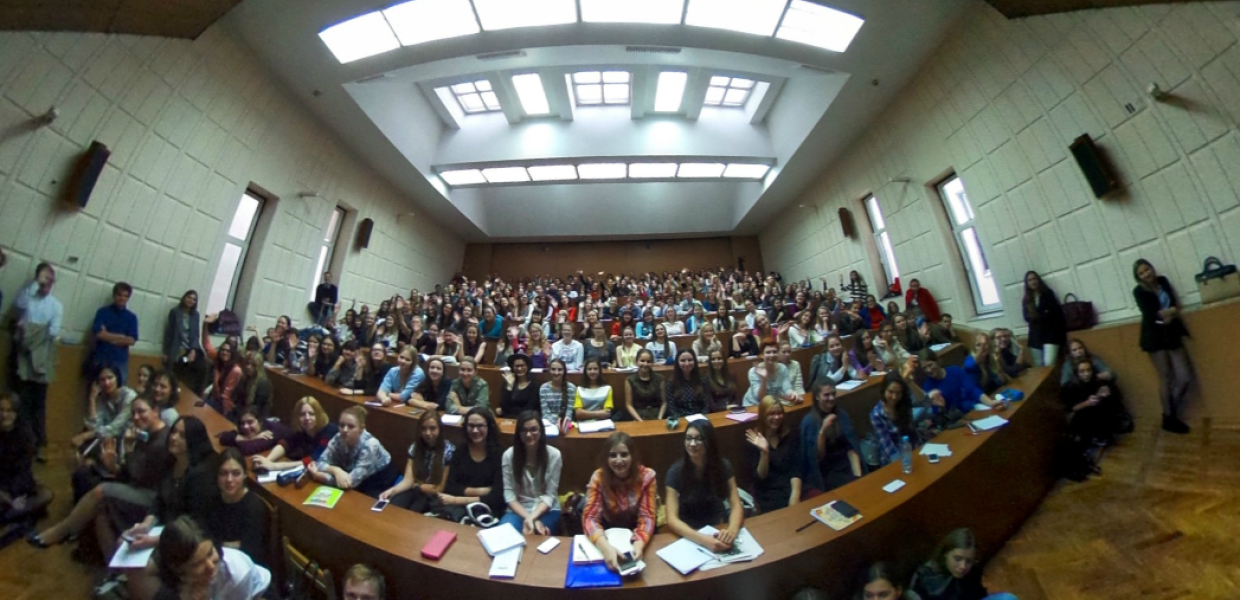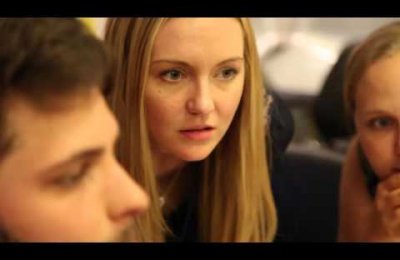Virtual reality technology is the next big thing in American journalism, and it’s also of interest to content creators around the world, as USC Annenberg professor Vince Gonzales found on a recent trip to Europe.
After speaking about digital storytelling at the USC Annenberg Center on Public Diplomacy’s Summer Institute in July, Gonzales was invited by U.S. State Department officials who had been in attendance to bring his knowledge of cross-platform journalism to Ukraine.
In late September and early October, Gonzalez spent eight days in Kiev speaking with government officials, embassy staff, professional media, and journalism students at two local universities, where he noticed several key differences between journalism in the United States and Ukraine.
“In Ukraine, journalism is seen as a way to defend democracy as opposed to a way to get a job, which was refreshing,” Gonzales said. “They see the digital tools not as a way to ensure a long career, but as a way to get the message out around the various controls and around various pathways that have been restricted to traditional news or to a few news oligarchs.”

Many of the young journalists Gonzales met with were eager to learn how digital tools, and in particular virtual reality, could be used to promote democracy. Students suggested that if the country were to ever experience another event similar to the Euromaidan, the revolution in which Ukraine ousted its president in 2014, virtual reality could serve to document and stream the uprising around the world.
“They immediately grasped it as a protection for democracy to say, the whole world is watching, and the whole world is watching in 360,” Gonzales said.
As a professor of professional practice and director of the USC Annenberg M.S. Journalism program, Gonzalez was eager to use the virtual technology tools he has been testing out at USC Annenberg to document his teaching and touristing in Kiev.
Though he found Ukrainian students and journalists to be interested in cutting-edge technology including virtual reality, Gonzales said their ability to do adopt the latest journalism tools was at times limited by the country’s infrastructure. For example, Ukraine doesn’t yet offer the cellular data system that has become standard in the United States, 4G LTE, and therefore mobile news is a relatively recent development in the country’s media landscape.
“They were very hungry to talk about it,” Gonzales said. “They all had iPhones, they know the digital tools, it’s just they hadn’t thought about how to use them for journalism.”
Gonzales said this challenged him to work around the technological restrictions he encountered to make digital journalism skills as accessible as possible.
“I’m not a coder, I’m not a computer scientist, so I try to teach tools that have been developed for people, for anybody, especially for journalists,” he said. “The idea was, here are ways to tell your story, online, in an app, on mobile, that are different than the ways you’ve done it in the past.”
One of the advantages of Ukraine’s slower technological development, Gonzales said, is that the country is able to learn from America’s own trajectory, and can essentially skip over technology that has become inefficient or obsolete.
“They’re prepared to leap frog things that we did in the United States,” Gonzales said. “They’re buying iPads, they’re not buying laptops. It’s interesting seeing things that have been proven here jumping there and then coming back to us, as here’s a different way to think about it. We didn’t think of it because we didn’t have the constraints that they had to operate under.”
Though the country’s technology may pre-date the United States’ in some areas, Gonzales said Ukrainian journalists are currently grappling with many of the same questions as their American counterparts.
For example, more and more younger Ukrainians get their news from social media and other mobile sources rather than websites, television or print media, and though newspapers are still operating, most Ukrainians acknowledge that their days are numbered. In addition to speaking with a public television station, Gonzales also met with reporters and staff at the internet television station Hromadske, which has found a dedicated audience despite being solely digital and serves as a prime example of the country’s changing media landscape.
“They all recognize that if they want to reach a younger audience — and this is professional journalists, government ministers — they have to be in these areas that require new forms of storytelling,” Gonzales said. “They’re beginning to learn some of the things we teach our students here.”
Gonzales said the young journalists he taught in Ukraine were eager to pursue new media, and with increased accessibility to digital storytelling tools, are learning to adapt to the same multiplatform news environment as USC Annenberg journalism students.
After spending a week in Ukraine, Gonzales made a second stop in Milan, Italy, where he was asked by USC Annenberg professor Jay Wang to shoot virtual reality photos and videos at the 2015 World Expo.
Wang had already conducted research and interviews as part of the his Branding Nations at the Milan Expo project through the Center on Public Diplomacy, and tasked Gonzales with capturing 360-degree content. Gonzales’ photos and videos will be combined with Wang’s interviews for a forthcoming virtual reality experience.
Since his visit to Europe, Gonzales has become interested in collaborating on several Ukrainian academic projects, and has already discussed returning to the country to help further develop its media for a new generation of journalists.
In the meantime, Gonzales said Ukraine’s views on the purpose of journalism have reinforced the mission statement he tries to impress upon students at USC Annenberg.
“I really do tell our students that ours is one of the few professions mentioned in the constitution, and that that means we have rights and responsibilities,” Gonzales said. “For a democracy to function, our role is not to tell people what they want to hear, or not to tell them what we think they need to hear, but to give them the information they need for our democracy to function and to me that’s a major issue we have right now.”








